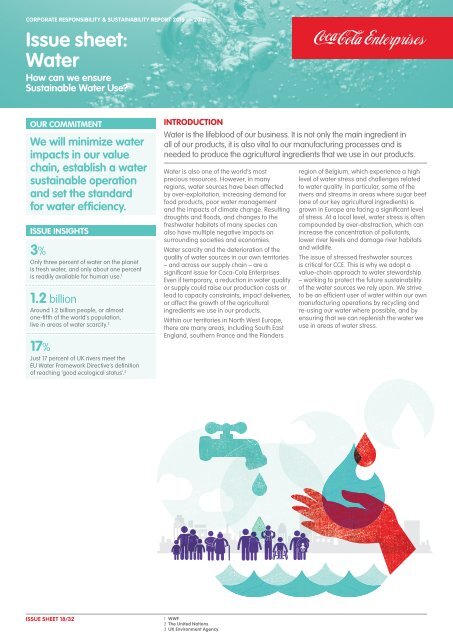Corporate Responsibility & Sustainability Report 2015/2016
1XlqBpD
1XlqBpD
Create successful ePaper yourself
Turn your PDF publications into a flip-book with our unique Google optimized e-Paper software.
CORPORATE RESPONSIBILITY & SUSTAINABILITY REPORT <strong>2015</strong> — <strong>2016</strong><br />
Issue sheet:<br />
Water<br />
How can we ensure<br />
Sustainable Water Use?<br />
OUR COMMITMENT<br />
We will minimize water<br />
impacts in our value<br />
chain, establish a water<br />
sustainable operation<br />
and set the standard<br />
for water efficiency.<br />
ISSUE INSIGHTS<br />
3%<br />
Only three percent of water on the planet<br />
is fresh water, and only about one percent<br />
is readily available for human use. 1<br />
1.2 billion<br />
Around 1.2 billion people, or almost<br />
one-fifth of the world’s population,<br />
live in areas of water scarcity. 2<br />
17%<br />
Just 17 percent of UK rivers meet the<br />
EU Water Framework Directive’s definition<br />
of reaching ‘good ecological status’. 3<br />
INTRODUCTION<br />
Water is the lifeblood of our business. It is not only the main ingredient in<br />
all of our products, it is also vital to our manufacturing processes and is<br />
needed to produce the agricultural ingredients that we use in our products.<br />
Water is also one of the world’s most<br />
precious resources. However, in many<br />
regions, water sources have been affected<br />
by over-exploitation, increasing demand for<br />
food products, poor water management<br />
and the impacts of climate change. Resulting<br />
droughts and floods, and changes to the<br />
freshwater habitats of many species can<br />
also have multiple negative impacts on<br />
surrounding societies and economies.<br />
Water scarcity and the deterioration of the<br />
quality of water sources in our own territories<br />
– and across our supply chain – are a<br />
significant issue for Coca-Cola Enterprises.<br />
Even if temporary, a reduction in water quality<br />
or supply could raise our production costs or<br />
lead to capacity constraints, impact deliveries,<br />
or affect the growth of the agricultural<br />
ingredients we use in our products.<br />
Within our territories in North West Europe,<br />
there are many areas, including South East<br />
England, southern France and the Flanders<br />
region of Belgium, which experience a high<br />
level of water stress and challenges related<br />
to water quality. In particular, some of the<br />
rivers and streams in areas where sugar beet<br />
(one of our key agricultural ingredients) is<br />
grown in Europe are facing a significant level<br />
of stress. At a local level, water stress is often<br />
compounded by over-abstraction, which can<br />
increase the concentration of pollutants,<br />
lower river levels and damage river habitats<br />
and wildlife.<br />
The issue of stressed freshwater sources<br />
is critical for CCE. This is why we adopt a<br />
value-chain approach to water stewardship<br />
– working to protect the future sustainability<br />
of the water sources we rely upon. We strive<br />
to be an efficient user of water within our own<br />
manufacturing operations by recycling and<br />
re-using our water where possible, and by<br />
ensuring that we can replenish the water we<br />
use in areas of water stress.<br />
ISSUE SHEET 18/32<br />
1 WWF.<br />
2 The United Nations.<br />
3 UK Environment Agency.


